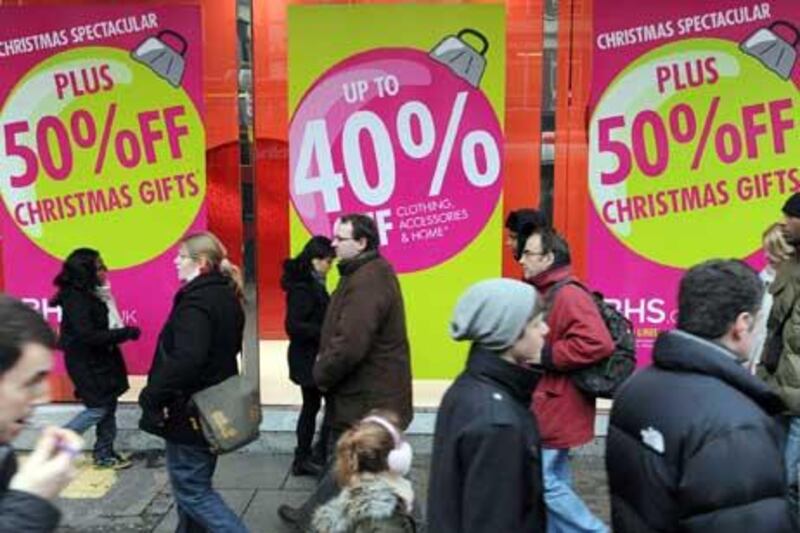Santa Claus looks certain to deliver the German economy a ?77 billion (Dh370.52bn) Christmas present.
Major retailers are confident the holiday season will be a record-breaker for Europe's top economy as consumers rush to buy gifts, with sales expected to rise by 2.5 per cent compared with last year.
"2010 could be our best Christmas for years, despite severe winter weather," Kai Falk, a spokesman for the German retail association HDE, said yesterday.
The retail group is predicting total sales of ?77bn in the vital last two months of the year. "This would be a return to normality following years of crisis," said Mr Falk.
After last year's recession, when the German economy shrank by nearly 5 per cent, the country has rebounded strongly, with growth of 3.4 per cent expected this year.
In the latest German business sentiment report released last week, the Ifo economic research institute found that confidence had reached an all-time high. "We are also expecting bumper post-Christmas trade," said Mr Falk.
But there was little Christmas cheer in other parts of Europe and the rest of the world.
In Ireland, Christmas retail sales are expected to fall 6.7 per cent from last year because of freezing conditions.
Consumers have also been suffering from two years of painful budgets, rising unemploymentafter the crash in the construction sector and the ?85bn rescue package from the EU and IMF.
"The retail industry has been hit with the perfect storm in recent weeks, giving the weakest period of trading in recent history," said David Fitzsimons, the chief executive of Retail Excellence Ireland.
"If IMF intervention and a very severe budget were not enough, the arrival of Arctic conditions has minimised shopping activity and left many of the largest destination shopping centres and cities near empty."
Heavy snow has also caused chaos in the UK, as shoppers search for last-minute gifts.
The atrocious weather has pushed retail sales down as much as 15 per cent a week, according to Andrew Wade, an analyst at Numis Securities in London.
"At a time when retailers were looking to play catch-up after the snowfall at the start of the month, the latest turn in the weather has dealt another cruel blow," said Tim Denison, the director of Synovate Retail Performance.
The number of shoppers visiting stores in the UK fell 8.8 per cent in the week that ended on Saturday, Synovate reported.
"Christmas-focused, low-margin retailers are most vulnerable," said Mr Wade. "Food and online will show resilience."
It was not just the UK that was being affected as Arctic temperatures swept across much of Europe.
"The weather is definitely having an impact," said Dino Lemma, the manager of the Geox store on Milan's trendy Vittorio Emmanuele shopping street.
"Shoppers that would have travelled into the city will have been put off by the freezing weather. While in other months we were beating our budget, we've been just about meeting it since the really cold weather started."
Back on London's Oxford Street, Andrea Hamilton, 25, was surprised not to see more shoppers flocking for last-minute gifts. "I'd expected it to be more crazy," she said.
The story was the same on the other side of the world. In Australia, retailers were hoping for an 11th-hour Christmas rush after a series of interest rate rises forced shoppers to tighten their belts.
Crowds were thin across major shopping districts and store windows were plastered with sale signs offering discounts as high as 90 per cent as traders limped into the all-important final shopping day before Christmas.
"I've been in retail five years and I've never seen business this slow," one assistant at Sydney's central Myer department store said.
"Even in the global financial crisis people were spending their stimulus cash [from the government]."
Recession-beating Australia is in robust economic health, but with the central bank trying to keep inflation in check by raising rates, consumers are beginning to feel the pinch.
* with Reuters, Dow Jones and Bloomberg
Holiday bonanza in Germany for a change
Santa Claus looks certain to deliver the German economy a ?77 billion (Dh370.52bn) Christmas present despite the winter weather and money worries elsewhere.

Editor's picks
More from the national




